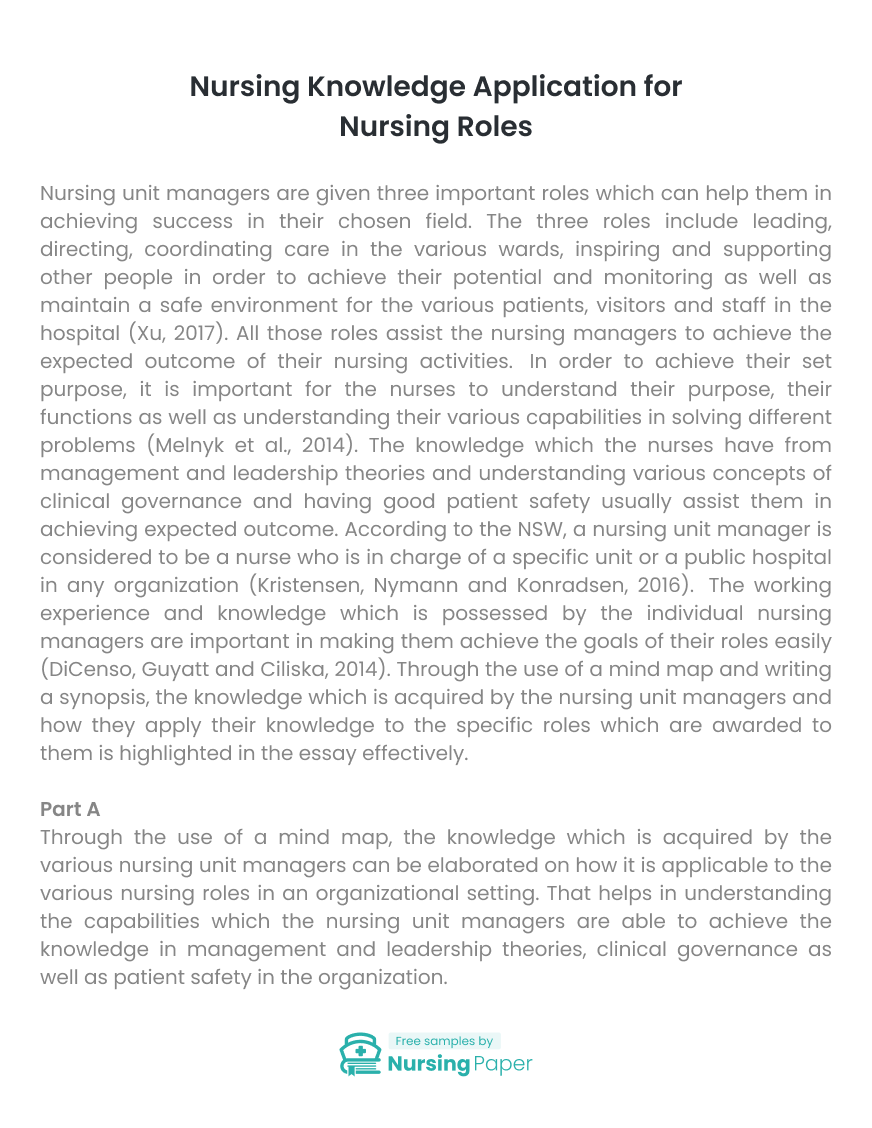1. Armstrong, S. J., Rispel, L. C., & Penn-Kekana, L. (2015). The activities of hospital nursing unit managers and quality of patient care in South African hospitals: a paradox?. Global health action, 8(1), 26243.
2. Atefi, N., Abdullah, K. L., Wong, L. P., & Mazlom, R. (2014). Factors influencing registered nurses perception of their overall job satisfaction: a qualitative study. International nursing review, 61(3), 352-360.
3. Blais, K. (2015). Professional nursing practice: Concepts and perspectives. Pearson.
4. Bormann, L., & Abrahamson, K. (2014). Do staff nurse perceptions of nurse leadership behaviors influence staff nurse job satisfaction? The case of a hospital applying for Magnet® designation. Journal of Nursing Administration, 44(4), 219-225.
5. Bryant‐Lukosius, D., Spichiger, E., Martin, J., Stoll, H., Kellerhals, S. D., Fliedner, M., … & Schwendimann, R. (2016). Framework for evaluating the impact of advanced practice nursing roles. Journal of Nursing Scholarship, 48(2), 201-209.
6. Butterworth, T., & Faugier, J. (2013). Clinical supervision and mentorship in nursing. Springer.
7. Chang, E., & Daly, J. (2015). Transitions in Nursing-E-Book: Preparing for Professional Practice. Elsevier Health Sciences.
8. Chenoweth, L., Merlyn, T., Jeon, Y. H., Tait, F., & Duffield, C. (2014). Attracting and retaining qualified nurses in aged and dementia care: Outcomes from an Australian study. Journal of Nursing Management, 22(2), 234-247.
9. DiCenso, A., Guyatt, G., & Ciliska, D. (2014). Evidence-Based Nursing-E-Book: A Guide to Clinical Practice. Elsevier Health Sciences.
10. Kearney-Nunnery, R. (2015). Advancing Your Career Concepts in Professional Nursing. FA Davis.
11. Keyko, K., Cummings, G. G., Yonge, O., & Wong, C. A. (2016). Work engagement in professional nursing practice: A systematic review. International journal of nursing studies, 61, 142-164.
12. Kristensen, N., Nymann, C., & Konradsen, H. (2016). Implementing research results in clinical practice- the experiences of healthcare professionals. BMC Health Services Research, 16, 48. http://doi.org/10.1186/s12913-016-1292-y
13. Laschinger, H. K. S., Nosko, A., Wilk, P., & Finegan, J. (2014). Effects of unit empowerment and perceived support for professional nursing practice on unit effectiveness and individual nurse well-being: A time-lagged study. International journal of nursing studies, 51(12), 1615-1623.
14. Manning, V., Jones, A., Jones, P., & Fernandez, R. S. (2015). Planning for a smooth transition: evaluation of a succession planning program for prospective nurse unit managers. Nursing administration quarterly, 39(1), 58-68.
15. Masters, K. (2015). Role development in professional nursing practice. Jones & Bartlett Publishers.
16. Melnyk, B. M., Gallagher‐Ford, L., Long, L. E., & Fineout‐Overholt, E. (2014). The establishment of evidence‐based practice competencies for practicing registered nurses and advanced practice nurses in real‐world clinical settings: proficiencies to improve healthcare quality, reliability, patient outcomes, and costs. Worldviews on Evidence‐Based Nursing, 11(1), 5-15.
17. Moore, L. W., Leahy, C., Sublett, C., & Lanig, H. (2013). Understanding nurse-to-nurse relationships and their impact on work environments. Medsurg Nursing, 22(3), 172.
18. Morton, P. G., Fontaine, D., Hudak, C. M., & Gallo, B. M. (2017). Critical care nursing: a holistic approach (p. 1056). Lippincott Williams & Wilkins.
19. Paliadelis, P. (2013). Nurse managers don’t get the corner office. Journal of nursing management, 21(2), 377-386.

The download will start shortly.






 Subject:
Subject:
 Number of pages: 2
Number of pages: 2